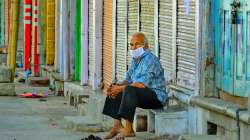28% of COVID-19 cases in India till April 30 asymptomatic: Study
At least 28 per cent of 40,184 people who had tested positive for COVID-19 between January 22 and April 30 in India were asymptomatic, a study found, raising concerns about the novel coronavirus being spread by those who show mild or no symptoms. At least 28 per cent of 40,184 people who had tested positive for COVID-19 between January 22 and April 30 in India were asymptomatic, a study found, raising concerns about the novel coronavirus being spread by those who show mild or no symptoms.

At least 28 per cent of 40,184 people who had tested positive for COVID-19 between January 22 and April 30 in India were asymptomatic, a study found, raising concerns about the novel coronavirus being spread by those who show mild or no symptoms. A large proportion of both those tested and those positive were asymptomatic contacts, according to the study by the Indian Council of Medical Research (ICMR) scientists along with other collaborators. Healthcare workers constituted about 5.2 per cent of the total infections, said the study published in the Indian Journal of Medical Research (IJMR).
According to the study, of the 28.1 per cent asymptomatic patients, 25.3 per cent were direct and high-risk contacts of the cases, while 2.8 per cent were healthcare workers in contact with confirmed the case without adequate protection.
"However, the proportion of the asymptomatic infected people could be much more than the 28.1 per cent and this is a cause of concern for us," Manoj Murhekar, director of the ICMR's National Institute of Epidemiology and one of the authors of the study, said.
The findings stated that the proportion of confirmed cases was highest among asymptomatic contacts, two-three-fold higher than among those with severe acute respiratory infection (SARI), those with an international travel history or healthcare workers, Murhekar said.
Between January 22 and April 30, a total of 10,21,518 people were tested for severe acute respiratory syndrome-coronavirus-2 (SARS-CoV-2).
Testing increased from about 250 individuals per day in the beginning of March to 50,000 by the end of April. Overall, 40,184 (3.9 per cent) tested positive for the novel coronavirus.
In this study, an analysis of the laboratory surveillance data was done to describe the testing performance and descriptive epidemiology of COVID-19 cases by time, place and person.
The attack rate (per million) by age was highest among those aged 50-69 years (63.3) and was lowest among those under 10 years (6.1). The attack rate was higher among men as 41.6 of them tested positive, while 24.3 of the women contracted the infection.
Coronavirus cases were reported from 523 of the 736 (71.1 per cent) districts in the country.
States with the highest proportion of districts reporting positive cases included Delhi, Maharashtra, Kerala, Punjab, Haryana, Tamil Nadu, Andhra Pradesh and Gujarat.
States/UTs with the highest test positivity are Maharashtra (10.6%), Delhi (7.8%), Gujarat (6.3%), Madhya Pradesh (6.1%) and West Bengal (5.8%).
Among the 12,810 cases with reported symptoms at the time of specimen collection, cough and fever were the most commonly-reported symptoms, while around one-third of cases reported sore throat and breathlessness.
Gastrointestinal symptoms such as abdominal pain, nausea, vomiting and diarrhoea were reported by less than five per cent of cases, the study stated.
With implementation of the ICMR's laboratory-based surveillance for the coronavirus, testing was available and accessible, and thus contributed to improved case detection throughout the country, the study underlined.
The network of COVID-19 testing laboratories and testing capacity continues to expand.
"While the cumulative number of cases continues to increase, the growth rate of reported cases has slowed," it said.